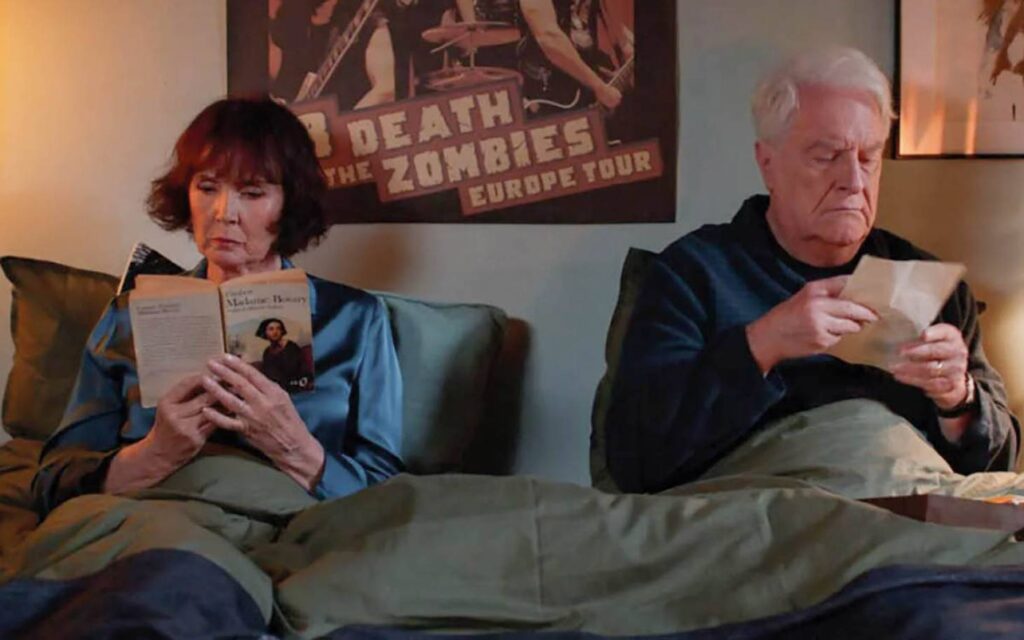by Hudson Moura
A long-hidden secret surfaces in the opening sequence of Riviera Revenge (N’avoue Jamais), directed by Ivan Calbérac, setting the stage for the film’s central conflict. At the heart of the story is a seemingly minor revelation: a letter from decades ago revealing that the protagonist, played by Sabine Azéma, had a brief affair in Nice 40 years earlier. However, this discovery shatters the delicate balance of her marriage because her husband, portrayed by André Dussollier, is a retired, severe, extreme right-wing general deeply rooted in ideals of duty, loyalty, and honour. For him, this revelation is not just a personal betrayal but a direct affront to his sacred values. The affair, particularly because it involved his best friend (Thierry Lhermitte), is seen as high treason deserving of a court-martial. His worldview, governed by strict codes of honour, violently clashes with the emotional complexity of a long-term relationship, where love and mistakes inevitably intertwine over time.

The dialogue subtly captures the tension between the couple. When the general remarks, “You’re reading Madame Bovary, too?” his wife responds, “It’s realism, Madame Bovary.” This exchange speaks volumes about their opposing views on infidelity—he sees it as an unforgivable betrayal, while she views it as part of the complexity of her ennui.
Though the film is a comedy, it delicately peels back the layers of its characters and their family dynamics. The general’s emotional absence and rigid authority have left deep scars on his children, who struggle under the weight of his harsh expectations. One particularly poignant moment occurs during a play by their son, which reflects the neglect he and his siblings experienced from their distant, controlling father. This scene symbolically portrays their emotional lives and the lasting impact of the general’s sternness.
The theme of time’s inevitable passage is also central—reuniting with past lovers is far from simple or romantic, forcing the characters to confront the profound changes that time has wrought. Dussollier’s general, trapped in his outdated ideals, increasingly finds himself out of sync with the world around him. His harshness and emotional distance are depicted as personal and societal flaws, further isolating him from those he loves.
Despite its warmhearted and humorous tone, the film never shies away from addressing deeper truths beneath the surface. It subtly critiques the rigid patriarchal values that shaped the general and the society he represents. His inability to adapt to a changing world is a metaphor for the dangers of holding onto an unyielding past.
Despite the betrayal and emotional upheaval, Riviera Revenge ultimately suggests that redemption lies in the enduring bonds of family and connection. As the characters wrestle with their pasts and each other, they find solace in the ties they’ve built over the years, highlighting the importance of reconciliation and mutual understanding.
With its layered performances, particularly from Sabine Azéma and André Dussollier, the film delivers a tender yet incisive exploration of love, loyalty, and the passage of time. At its heart, the story raises the question of whether the husband’s emotional absence drove the wife to her brief infidelity or if it was simply a personal longing for connection. The film leaves this ambiguity unresolved, inviting viewers to draw their conclusions about love and fidelity. Even though the cycle of secrets and solitude may never fully be broken, the family endures—albeit imperfectly. This bittersweet aspect adds depth, revealing that the struggles within their marriage are part of a larger narrative of sacrifice and neglect, both on a personal and societal level.
Don’t miss the final scene, which delivers one of the film’s best jokes—a brilliantly timed moment that beautifully closes the story on a note of humour. However, it perhaps only scratches the surface of the deeper emotions and unresolved tensions lying beneath. The film will be presented at Cinéfranco—Festival International du film francophone, from November 1 to 10, 2024, at the Carlton Cinema in Toronto.